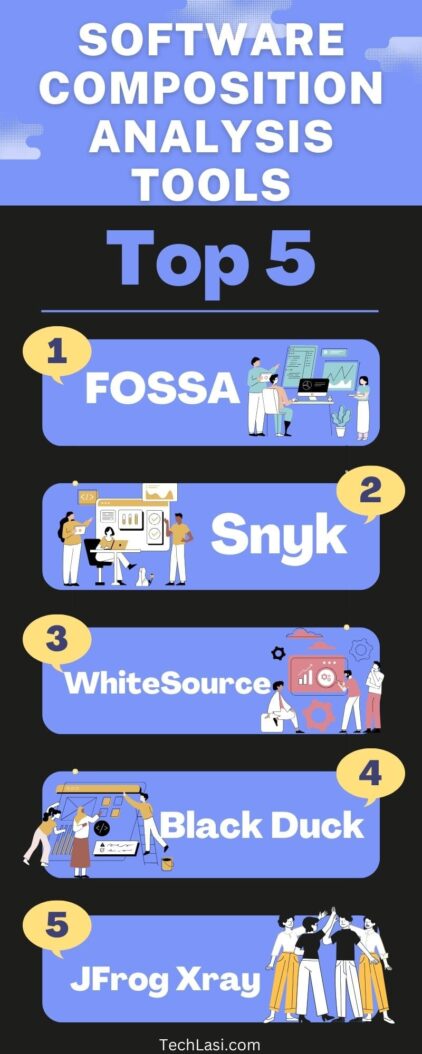Software composition analysis (SCA) scans source code to identify open source components and reveal any associated security vulnerabilities or license compliance issues. As open source adoption surges, SCA grows increasingly vital for managing risks inherent with integrating third-party code. This guide examines 18 leading SCA tools available to aid organizations in securing the software supply chain against rising threats.
Automating Open Source Management with SCA
Manual tracking and auditing of open source components incorporated into custom code presents an impossible task as application volume, size, and complexity builds. These automated SCA utilities help development teams better control open source.

Black Duck
For over 20 years, Black Duck bolstered open source security and compliance through SCA able to identify vulnerabilities stemming from open source dependencies and license conflicts. Synopsys recently acquired the product, enhancing functionality.
Snyk
Snyk takes an intelligent approach to SCA, using machine learning combined with an extensive vulnerability database to detect problematic open source dependencies without interrupting development workflows. This developer-first SCA tool integrates tightly with popular DevOps platforms.
WhiteSource
WhiteSource centralizes open source management via robust SCA identifying security, license, and quality risks associated with open source components. This comprehensive SCA platform helps enterprises maintain conformance through automated enforcement policies.
SCA Tools Providing Cloud Native Protection
As deployment models shift toward cloud native infrastructure, software teams need SCA purpose-built to protect containerized workloads and serverless functions running on orchestrators like Kubernetes. These options fill the gap.
Anchore Engine
The Anchore Engine delivers strong SCA capabilities specialized for securing cloud native CI/CD toolchains and container deployments at scale. This open source analyzer identifies vulnerabilities in container images and compares against user-defined security policies.
Snyk Cloud Native Application Protection
Beyond scanning source code, Snyk also provides runtime SCA to protect production Kubernetes workloads. This CNAPP offering monitors deployments for newly disclosed issues in container images from public registries.
Embedding SCA Testing into CI/CD Pipelines
To enable DevSecOps practices where security intertwines with development, SCA testing needs tight integration with CI/CD automation. These options embed analysis.
Sonatype Nexus Lifecycle
Sonatype Nexus Lifecycle fully automates SCA by integrating open source intelligence directly into build pipelines. This DevOps-native analysis enables teams to fail fast by uncovering flaws and policy violations pre-production.
JFrog Xray
JFrog Xray provides universal artifact analysis to scan binaries, dependencies, and containers for security issues throughout automated application releases. This pipeline-native SCA combines multiple scan types to take a holistic approach optimized for DevOps workflows.
Multi-Language SCA Tools
Development teams rely on a growing array of programming languages for different projects, so SCA utilities must cover beyond just Java and JavaScript to identify vulnerabilities in code written using diverse languages.
Veracode Software Composition Analysis
Veracode SCA accepts over two dozen file types for scanning, allowing consistent analysis of applications built using Java, JavaScript, C#, PHP, Python, and other languages. This broad language support extends protection across polyglot projects.
FOSSA
FOSSA provides extensive language coverage for SCA, analyzing dependencies and licensing down to the submodule level for Java, Python, Javascript, Ruby, C/C++, and other languages. This scalable SCA utility combines blazing scanning speeds with an intuitive UI.
Integrated SCA Solution Suites
While point solutions help, integrated SCA paired with complementary capabilities enables more holistic vulnerability management spanning the full software development lifecycle. These unified suites deliver expanded protection.
Checkmarx Software Security Platform
The Checkmarx Software Security Platform combines SCA for open source auditing with SAST, IAST, SCA, and developer awareness capabilities providing comprehensive AppSec testing and protection. This unified AppSec suite embeds security into every phase.
Contrast Application Security Platform
The Contrast Application Security Platform augments SCA testing with interactive application security testing, runtime application self-protection, and observability enabling developers to better understand vulnerabilities and block attacks. This integrated platform secures code from creation through production.
Extending Enterprise SCA Across Multiple Applications
Larger organizations often implement SCA testing across numerous development teams working on a wide range of coding projects simultaneously, demanding enterprise-grade scalability to span diverse needs. These SCA scale efficiently.
Flexera ScanCentral
Part of the Flexera Tech Insights portfolio, ScanCentral provides enterprise-wide scale to enact consistent open source auditing, license compliance, and security policies across endless applications enterprise-wide. This distributed SCA framework accommodates massive software portfolios.
Conclusion
This guide should provide teams a helpful starting point for evaluating capable SCA tools to institute open source management controls at either small-scale or enterprise levels. With breaches often exploiting vulnerabilities stemming from unmanaged dependencies, software development leaders must implement robust controls for tracking third-party code inclusion, licensing, and updating. The costs of ignoring SCA likely outweigh investments required to automate open source governance.
FAQs
What does an SCA tool scan?
SCA tools scan source code along with dependencies to identify all integrated open source components, reveal associated vulnerabilities, highlight license conflicts or policy violations, and provide detailed inventory reports needed to manage third-party code risks across the SDLC.
Is SCA the same as SAST?
SCA focuses specifically on auditing third-party open source code dependencies, while SAST analyzes proprietary source code for security weaknesses. Robust application security testing regimes typically incorporate both SCA and SAST testing.
Does SCA scan at runtime?
Most SCA tools conduct static scanning of code repositories rather than runtime analysis. Integrating SCA with interactive application security testing (IAST) or runtime application self-protection (RASP) extends open source monitoring deeper into production.
Can SCA help with license compliance?
Yes, SCA tools automatically track open source licenses and usage levels, then alert development teams regarding conflicts or violations of open source licensing terms to avoid legal risks associated with open source dependencies.
Why is open source management important?
Streamlining open source tracking allows faster remediation when new vulnerabilities emerge in widely used libraries. Disorganized open source governance also risks licensing conflicts and breaches. Solid SCA practices help secure the exponentially expanding software supply chain.

